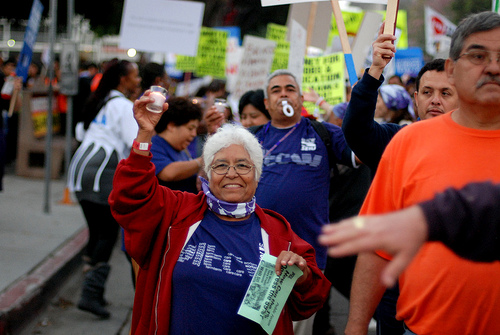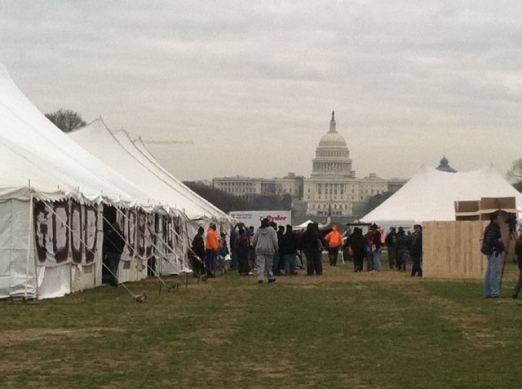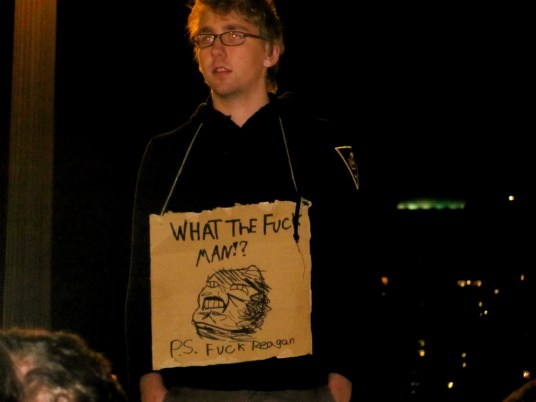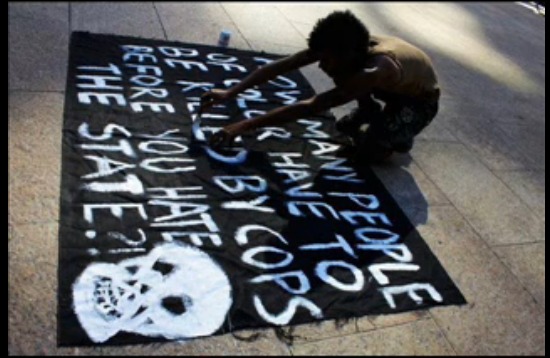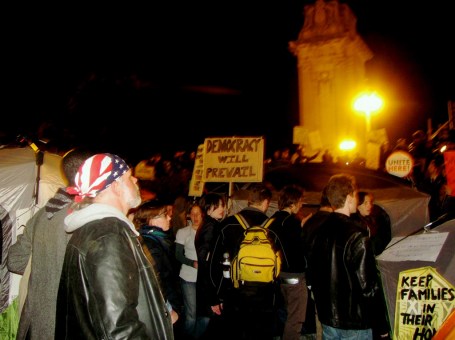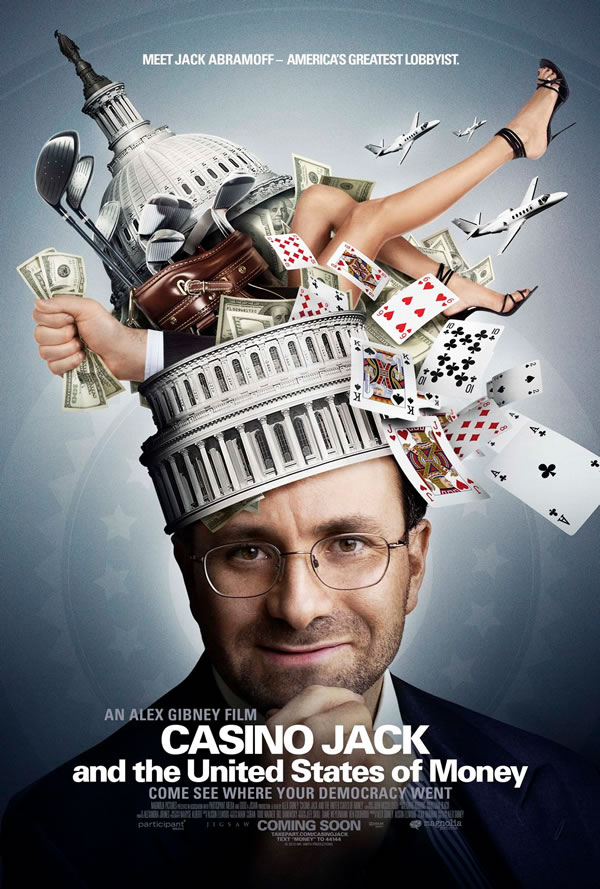Occupy DC Preserves Message, Not Unions
Tensions are rising between Occupy protesters and labor unions in Washington, DC. An article in last Thursday’s Examiner reports that Occupy DC will not be lending support to a five-day “Take Back the Capitol” protest put on by labor unions, despite unions’ support of Occupy since October.

700 workers represented by the Air Line Pilots Association marched with Occupy Wall Street in late September (via dailykos)
The reasoning behind the stance may have some clout to it — in the reality of the political spectrum, Republicans and Democrats are practically two wings of the same party, therefore, supporting the ideals of the Democratic Party implicitly means supporting the pay-for-play government structure that Occupy is opposing. But some of the statements released regarding the action (or lack of action) err on the side of hypocritical, juvenile and downright irresponsible, hinting toward butt-hurt ego politics and using accusatory language:
“‘They’re undermining the whole point. We want to take power and give it to the people, not unions,'” said McPherson protester Benjamin Faure. ‘If a union can win over everyone at the square, go ahead and let them try.'”
This is pretty nonsensical, if not at least a little offensive. The labor movement has historically been a movement of and for the people. Unions have fought for living wages, reasonable work weeks, benefits for workers, and preservation of dignity for everyone. Valuing work without without unions can be a slippery slope into the waters of the bootstraps narrative, one which leads us to believe that every one of us is given an equal opportunity to succeed, if only we were willing to work hard enough.
In late September and early October, major labor unions marched with Wall Street occupiers, and it was like a sprouting movement had put down its roots. Maybe the unions can’t “win over everyone at the square,” but securing dignity and safety for individuals doesn’t always take place in the spotlight.
The action was a huge statement of solidarity, and it made a big statement for the occupiers: Take us the fuck seriously. Our message has power and history and validation. We are not speaking out of turn, we are speaking out. On November 30, Occupy DC released its Official Declaration, the list of grievances which includes:
“Those with power have divided us from working in solidarity by perpetuating historical prejudices and discrimination based on perceived race, religion, immigrant or indigenous status, income, age, gender, gender identity, sexual orientation, and disability, among other things. These divisions have inhibited our ability to work in solidarity, though today we recognize the power of uniting as the 99 percent.”
Taking that into account, this break feels like a loss, because occupiers and labor organizers can learn so much from each other. Labor unions may advocate for a different means to an end, but ultimately the end is the same, and so is much of the problem. Occupiers fight corporate culture and challenge its face; labor unions protect those who stand to be exploited by it. Worker training programs at corporations like Target are notorious for anti-union propaganda. Conservatives portray unions as exploitative of people of color. Corporations make structured attempts to divide workers and keep them powerless. Unions and occupiers know that power lies in numbers. It seems contradictory to build a movement that is intentionally pervasive and then accuse pre-existing movements of co-option when they continue to do their work. Intersectionality exists, movements overlap.Where is the line into co-opting drawn, and who gets to draw it? And although this may not be the intent of DC Occupiers, the message that we’re hearing is that calling a movement out on being non-inclusive to women and people of color is divisive, but rejecting factional support preserves integrity. What was supposed to be a solidified, widespread movement has now become a dictation of who is and who isn’t allowed to be in the 99 Percent.
But what would worlds look like where both occupiers and labor rights organizations each saw their visions come true? Probably pretty similar. A world where all people have respect and dignity, regardless of race, class or gender, where we don’t have to be dependent on corporations for jobs or resources. That’s a shift in power. And it has to start somewhere. The workforce is vast and diverse, and respecting workers is something that can be truly revolutionary. What happens when a housekeeper is well-compensated for hard work, long hours and physically exhausting labor? What happens when an undocumented kitchen worker doesn’t have to fear speaking out against an employer’s abuses for fear of deportation? What happens when a server can defend themselves against verbal abuse by customers without fear of losing their job?
Answering these questions is something that can transform a society. We can be a society where we don’t have to be afraid to demand respect. Because a society like that will be made up of people who know what their voices sound like, and those voices won’t be afraid to demand change.
![]()
Disclaimer: The opinions, beliefs and viewpoints expressed by an individual author do not necessarily reflect the opinions, beliefs and viewpoints of Autostraddle or official policies of Autostraddle.
Twentysomethings Living at Home Are Destroying the Economy!!!
According to the New York Times, I’m partially to blame for the failing economy. You see, like 14.2 percent of young adults, I live with my parents. I moved back home after I graduated five months ago and I don’t plan on leaving until next summer.
If you’ll believe Catherine Rampell, I’m depriving the economy of $145,000 by living here. If I moved out, I’d be buying Pöalågnar frying pans at IKEA, banging my head against the wall while I wait for Mr. Comcast to show up between 9am and 7pm, and hiring “a handyman to hang a newly framed diploma.”
Let’s gloss over that fact that anyone who needs a handyman to hang a frame has more basic issues on their plate than stunting economic growth and talk about the real costs of living at home. It might be true that moving out and spending money benefits the economy, but where’s that money supposed to come from? With only 74 percent of 25-34-year-olds currently employed and the average graduate carrying over $25,000 in student loan debt, it’s no longer clear what the responsible choice should be.
Rampell did an exceptional job of finding two people, Jay Bouvier and Hollis Romanelli, who are unlike to garner any sympathy. Both have full time jobs–Bouvier makes $45,000 a year after taxes — and neither pay their parents rent. Romanelli even admits that she’s spent her first 2 months worth of paychecks treating herself. Rampell all but paints a picture of selfishness — Romanelli is guilty of indulging when so many are un- or underemployed and Bouvier saves his money when he could be out buying houses and helping “the economy.”
Am I wrong to think that the economy is a means and not an end? There’s always more to an issue than just money. In order to better understand what’s going on, I’ve compiled a pros and cons list for those of you considering moving back home.
Top 5 reasons living with your parents is irresponsible:
5: You’re hurting the economy by living in your old bedroom. (See above)
4: You’re missing out on character-building rites of passage like cockroaches and park bench masturbators*.
3: You can’t develop real relationships with friends or significant others due to lurking parents.
2: You’re putting financial strain on your parents who once again have to feed and shelter you.
1: You’re not taking on responsibilities like a Real Adult® and will never properly learn how to pay rent, take out the trash, and shovel your stoop when it snows.*
Top 5 reasons living with your parents is responsible:
5: Remember how much people like to talk about how 20-something are all capricious nincompoops who have no sense of self-control, no plans for the future, and no moral fiber? By living at home, you can learn all about budgeting and credit scores at the dinner table, overhear FOX News playing on the TV downstairs, and never ever have sex ever. It’s like a conservative’s dream world.
4: Do you really need to live on your own? If roommates are out of the question and your only options are living with your family and living by yourself, your family could be the better option. Environmentalists will thank you for keeping plastics production, waste, and energy usage down.
3: Do you know where college students and recent college graduates tend to live? I will tell you: in poor neighborhoods. If you’re in college, you know that you’ll only be living there for 4 years max. Which means that you probably won’t get involved with your community or care if you keep your neighbors up until 4 a.m. with your frat party. If you’re a graduate, you’ll probably be moving away when you can afford it and are similar to undergraduates in terms of how you see your ‘hood. Treating neighborhoods as disposable isn’t helpful for people who will live there for many years or their whole lives. Clearly not everyone does this, but if you’ve ever looked at the amount of trash on the streets in university off-campus housing you’ll know that there are enough people who do to make it a problem. By living at home, you help keep neighborhoods neighborhoody.
2: Two words: mental health. Have you ever tried finding a therapist? It’s really effing hard work. Having people (or dogs) who care about you around can make it easier to get through really bad days. They might even help you look for a therapist. On the other side of the coin, if you find you’re losing the motivation you once had, going home can be a refresher course on all the reasons you wanted to leave Ohio/wherever in the first place and get you back on track.
1: I bet your grandparents are lonely. I bet your parents need help cleaning out the basement. I bet your little brother needs to be picked up from school. Living at home can be fantastic because you can help people and they can hug you.
So. This may be a slightly skewed list, but we home-livers get a bad rap. We all make choices that work for us. Some of us move home because we’re not sure where to go next. Some don’t have the option to go back because it’s no longer a home for us. I chose to move home because I needed a place to make decisions, my family needed my help, and I needed reminder that I wasn’t alone. It’s about more than just money. What works for me probably doesn’t work for you and that doesn’t automatically make any of us less responsible for our lives or more responsible for the economic crisis. When I move out next year, I know I’ll be ready, I’ll be thankful, and I won’t be back.**
Who do you live with? Where do you live? Do Europeans really think we’re crazy for moving out before we can really afford it?
*Been there, done that, character built.
**Except to visit, obviously.
Feature photo via: New York Magazine
Playlist: Talkin’ Bout a Revolution
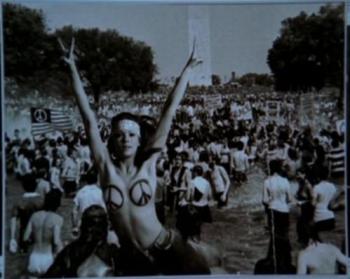 This is shaping up to be quite a time, kids. Quite a time. Basically The Occupy Movement has shown us we’ve got enough people on our side to win this thing if we all just mobilize properly. Therefore it’s important to be as militantly committed to your politics at all times, so that we can mind control the government into getting their shit together. This music will help keep you in a state of constant Occupation.
This is shaping up to be quite a time, kids. Quite a time. Basically The Occupy Movement has shown us we’ve got enough people on our side to win this thing if we all just mobilize properly. Therefore it’s important to be as militantly committed to your politics at all times, so that we can mind control the government into getting their shit together. This music will help keep you in a state of constant Occupation.
Career Opportunities – The Clash (1977)
Revolution – The Beatles (1968)
Stars and Stripes of Corruption – The Dead Kennedys (1985)
Grandmaster Flash – The Message (1982)
Let’s Get Together – The Youngbloods (1969)
Power to the People – John Lennon and the Plastic Ono Band (1971)
Hammer and a Nail – The Indigo Girls (1991)
American Idiot – Green Day/Broadway Cast Recording (2009)
Changes – Tupac (1992)
Which Side Are You On? – Natalie Merchant (cover, originally written in 1931)
The Times They Are A-Changin’ – Bob Dylan (1964)
Redemption Song – Bob Marley (1980)
Freedom 90 – George Michael (1990)
Rebel Girl – Bikini Kill (1992)
If the Kids are United – Sham 69 (1978)
What’s Going On – Marvin Gaye (1971)
Uprising – Muse (2009)
Talkin’ Bout a Revolution – Tracy Champman (1988)
listen at 8tracks or here:
Occupy Oakland’s Awesomeness Triumphs Over Fringe Craziness
The sun set on Wednesday night while we were on the freeway overcrossing at the Port Of Oakland, having marched there with somewhere between 7,000 (conservative estimate) and 20,000 (liberal estimate) other people. (However I’d accidentally over-ingested some whiskey shortly beforehand, so to me, it looked like somewhere between 14,000 and 40,000 other people.)
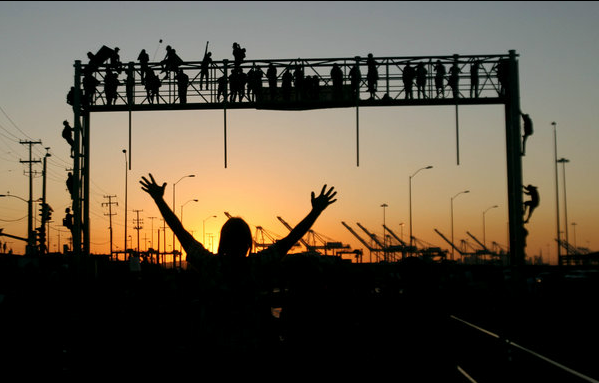
photo via mercurynews.com
People were sitting on top of trucks and most of us were walking our bicycles. Longshoremen, prevented by their union from striking, expressed solidarity at the picket line by honking their horns and talking with protesters. Many just turned around and went home, due to a provision in their contracts which does not require them to work if there is a disturbance in the port. Shortly after sunset it was announced that the protest had officially shut down the Port of Oakland, the nation’s fifth-busiest port. Everyone cheered and we cheered too and then we rode our bikes 60 blocks home.
And then, apparently, as most of the city slept, a bunch of assholes went around fucking shit up in the name of Occupy Oakland. They set shit on fire, vandalized buildings, broke windows, and allegedly attacked police officers. By the end of the standoff, 80 protesters were arrested. And yesterday that’s all anybody could talk about, and I guess I can’t blame them, because look here I am, also talking about it. How the hell did this…
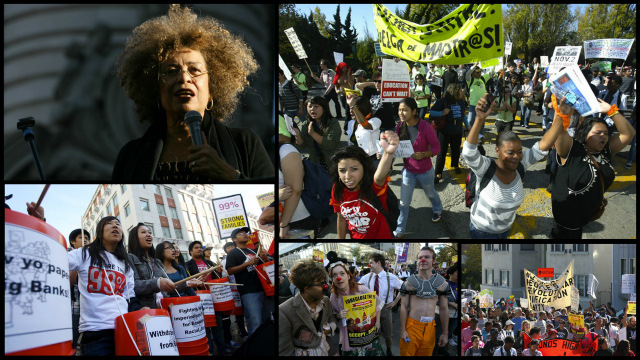
…turn into this?
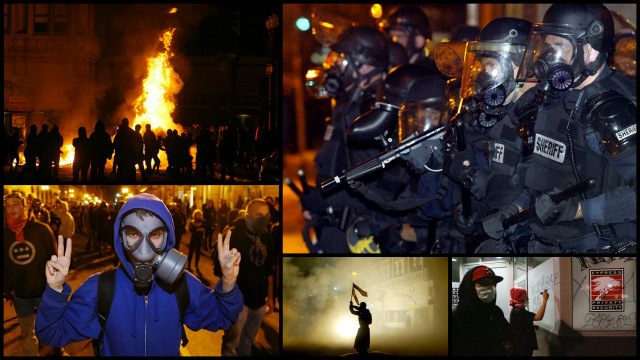
Well, long story short: it didn’t. But let’s begin at the beginning.
Occupy Oakland has been the focus of much world attention since it began on October 10th. Last week Oakland had the unfortunate honor of being the location of a massive and ultimately violent standoff between police and Occupiers, in which police unleashed tear gas and rubber bullets upon unarmed protesters, leaving many injured and critically wounding Marine Iraq veteran Scott Olsen.
Occupy Oakland actually runs a pretty tight ship under the supervision of a “Unified General Assembly.” The objectives as laid out on the Occupy Oakland website are to “reclaim public space to use as a forum for the people to come together, meet one another, listen to each other, and build power for ourselves… to plan actions, to mobilize real resistance, to defend ourselves from the economic and physical war that is being waged against our communities.”

photo by me
On November 2nd, Occupy Oakland called for a General Strike, the first held in the city since 1946. They called on workers and students to walk out of class/work or take a vacation/sick day to join the occupiers. According to TruthOut, 16 percent of the city’s teachers didn’t show up for work and some high school students were given the day off. Half a dozen marches on banks and corporations shut down Wells Fargo, Chase, Citibank and Bank of America. Occupy Oakland said about 10,000 people were there during the day, which included 800 children, parents and teachers who gathered at the Oakland Main Library. There were poets there you guys, POETS! You can get the most accurate view of Tuesday’s events, really, on Occupy Oakland’s facebook page.
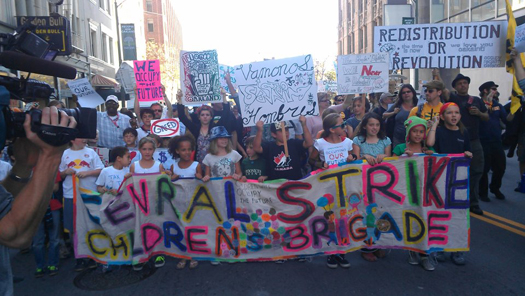 The day began with Angela Fucking Davis at 9:30, and by the time I got there in mid-afternoon the scene could best be described as a Social Justice Festival — heaps of performances and speakers, including some spoken word poets and kids from the Destiny Arts Center that I could’ve watched all day.
The day began with Angela Fucking Davis at 9:30, and by the time I got there in mid-afternoon the scene could best be described as a Social Justice Festival — heaps of performances and speakers, including some spoken word poets and kids from the Destiny Arts Center that I could’ve watched all day.
I used the video function on my camera for the first time to film some of that — it’s not edited, just random footage (also I clearly didn’t realize that shooting vertically would result in a sideways shot):
The crowd was remarkably diverse both racially and age-wise, in addition to sporting a visible contingency of alternative lifestyle haircuts, pot-smoking hippies and punk kids. (The San Francisco Gate has a nice piece on the diversity at Occupy.) 4,000 free meals in the form of hot dogs, hamburgers, veggie dogs and veggie burgers were distributed by the Alameda Labor Council with grills manned by City of Alameda firefighters and Alameda Local 689. It was almost an exact demonstration of how peaceful and happy people can be when you take commerce out of the picture.

a lot of spiritual shit was going on there
I think for a lot of us who have been upset about these issues for years now, it’s just incredibly affirming and encouraging to see this thing actually happening.
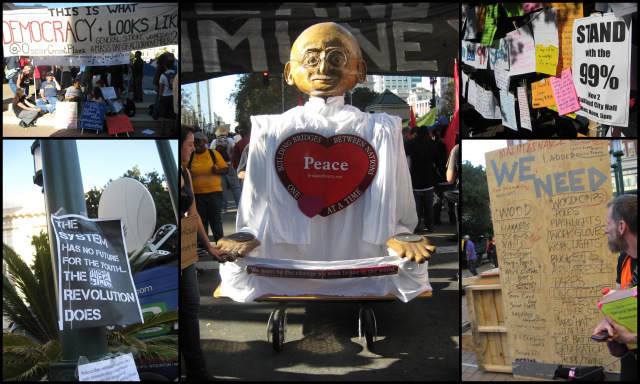
But according to the San Francisco Gate, things “descended into chaos after midnight.” Fires were set, windows were shattered, graffiti plastered the walls of banks and other buildings. Police arrived in riot gear, utilizing tear gas and flash-bang grenades to disperse the activity. Police officers claimed they had pipes, hammers, glass bottles, rocks and cobblestones thrown at them and some protesters claimed that officers “beat anyone who ran and arrested anyone who stood still.”
The Gate quotes a resident of the area who said, “The protest is supposed to be about corporate greed. It’s not about trashing the streets of Oakland.” The Gate quotes a man who was standing there when they took that quote, “These are drastic measures, to make people listen. This is our block now.”
WHAT THE FUCK? Are we in second grade where when you like a girl you throw spitballs at her neck or something.
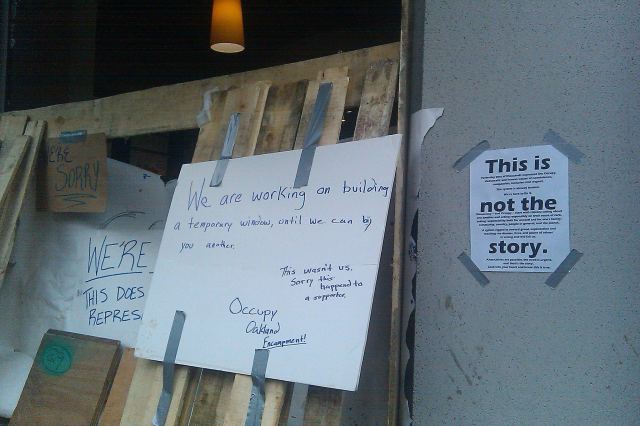
On Thursday the Occupy Oakland group did everything it could to distance itself from the “provocative fringe” who’d done such damage. The occupiers committed to helping the city clean up and disavowed the violence. I don’t know what else to say, besides that it kinda rocked.
According to The San Francisco Gate, there was some dissent over how to handle the “black bloc” tactics, which “have been a source of debate in the Bay Area activist community for years.” Some wanted to issue an official apology, but some argued that the actions were “irrelevant” and “trivial” and that “the people of Oakland were highly reassured by the unity of this community.”
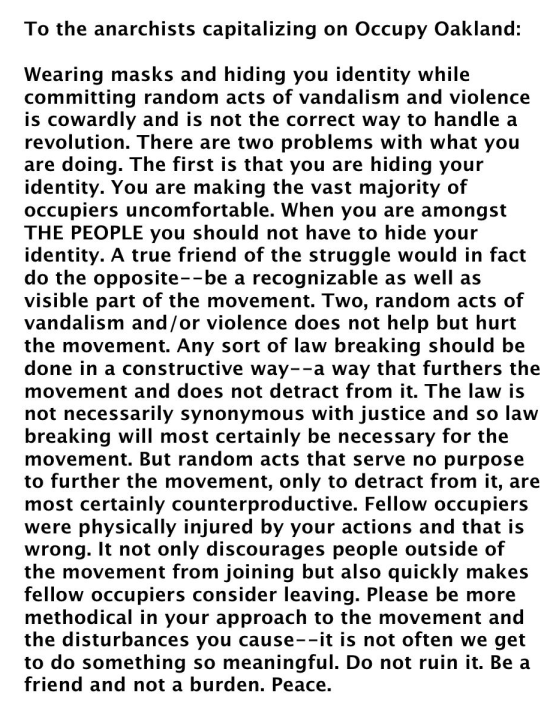
from occupy oakland facebook
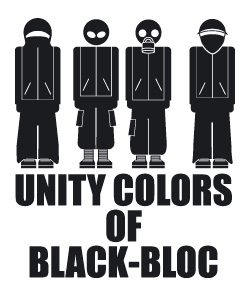 The term “Black bloc” is often misused to describe a group of anarchists, but it’s not a group, it’s a strategy. The protest tactic was developed in the 1980s by Autonomists (a set of left-wing political/social movements somehow related to the socialist movement) (not my socialist movement!) in Europe and it involves people fucking shit up while hiding themselves in black clothing, scarves and ski masks and carrying shields/truncheons. Black bloc groups were most visible at the 1999 anti-WTO demonstration when they damaged a lot of retail property in Seattle including precious Starbucks. Tactics include vandalism, rioting, street-fighting, misleading authorities, demonstrating without a permit and building barricades. Favorite targets include banks, outlets of multi-national corporations and institutional buildings.
The term “Black bloc” is often misused to describe a group of anarchists, but it’s not a group, it’s a strategy. The protest tactic was developed in the 1980s by Autonomists (a set of left-wing political/social movements somehow related to the socialist movement) (not my socialist movement!) in Europe and it involves people fucking shit up while hiding themselves in black clothing, scarves and ski masks and carrying shields/truncheons. Black bloc groups were most visible at the 1999 anti-WTO demonstration when they damaged a lot of retail property in Seattle including precious Starbucks. Tactics include vandalism, rioting, street-fighting, misleading authorities, demonstrating without a permit and building barricades. Favorite targets include banks, outlets of multi-national corporations and institutional buildings.
Former Bay Area conflicts with black bloc protesters include a January 2003 march against invading Iraq, where a splinter group broke off from the peaceful protest, 150,000-200,000 strong, to vandalize the Financial District by breaking windows, tagging buildings with graffiti and dragging news racks into the street.
From a historical perspective, black bloc groups have often been a thorn in the side of peaceful protesters, but the media seems to be framing Wednesday’s activists as a specific fringe incited by the spirit of the 99%. But that’s just not the case. Sure, I was raised by very politically active anti-violent hippies who wouldn’t even let us own a squirt gun, but I just can’t see any benefit to violence as activism. What do you think?
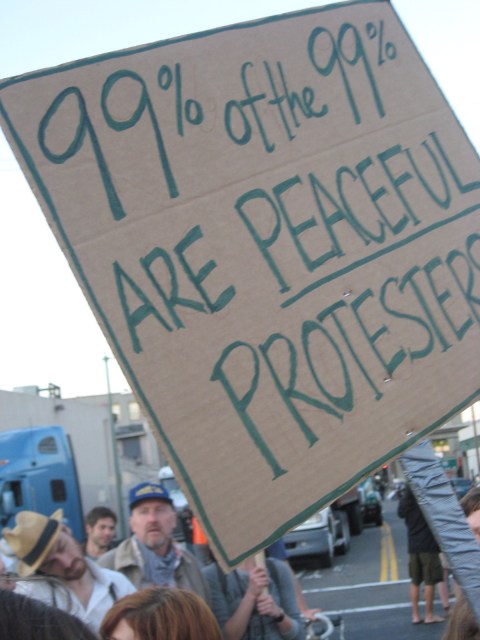
photo by me, sign by edie
In any event, Wednesday’s protests were still, I believe, a success. It looks like Oakland will remain in the spotlight as this movement evolves, especially as low temperatures and snowstorms freeze out protesters throughout the East and Midwest. There is no weather in Oakland, it’s always 70 degrees. Oakland can do this shit all year, bitches!
And then Judith Butler Showed up at Occupy Wall Street
Theory and direct action made-out in public this week when Judith Butler showed up to voice support of Occupy Wall Street at Zuccatti Park as reported on Feministing.
Feminist and queer theorist Judith Butler is currently a visiting Philosophy professor at the New School in New York. (Can I sneak into a class or something? Any New School readers, lemme know.) For a recap of her work, check out Julia’s Judith Butler 101 post published last year.

Judith Butler (Credit: Hendrik Speck/egs.edu/AP)
Judith Butler made a longer speech at NYC’s Washington Sq. Park and speaking through the people’s mic, Butler appealed to the power of the physical body in politics noting:
It matters that as bodies we arrive together in public. As bodies we suffer, we require food and shelter, and as bodies we require one another in dependency and desire. So this is a politics of the public body, the requirements of the body, its movement and its voice.
And the full transcript for Judith Butler’s Washington Square Park speech:
Hello everybody. I’m Judith Butler. I have come here to lend my support and offer my solidarity for this unprecedented display of popular and democratic will. People have asked, so what are the demands that all these people are making? Either they say there are no demands and that leaves your critics confused, or they say that demands for social equality, that demands for economic justice, are impossible demands, and impossible demands are just not practical.
But we disagree! If hope is an impossible demand, then we demand the impossible. If the right to shelter, food, and employment are impossible demands, then we demand the impossible. If it is impossible to demand that those who profit from the recession redistribute their wealth and cease their greed, then yes, we demand the impossible.
Of course, the list of our demands is long. These are demands for which there can be no arbitration. We object to the monopolization of wealth. We object to making working populations disposable. We object to the privatization of education. We believe that education must be a public good and a public value. We oppose the expanding numbers of the poor. We rage against the banks that push people from their homes, and the lack of health care for unfathomable numbers. We object to economic racism and call for its end.
It matters that as bodies we arrive together in public. As bodies we suffer, we require food and shelter, and as bodies we require one another in dependency and desire. So this is a politics of the public body, the requirements of the body, its movement and its voice. We would not be here if electoral politics were representing the will of the people. We sit and stand and move as the popular will, the one that electoral politics has forgotten and abandoned. But we are here, time and again, persisting, imagining the phrase, “we the people.” Thank you.
It’s stimulating to see an academic engaging with direct democracy in the streets but it’s not lost on me that Butler is teaching at the New School which has, to my mind, an outrageous tuition. ($1,645 (per credit).) I can’t imagine it will be long before there will be an academic panel dissecting the Occupy Wall Street phenomenon, so we will keep you posted!
Keeping It Real: Authentic Diversification in Occupy Wall Street
[feature image from reuters.com]
I’m going to be honest here — Occupy Wall Street stresses me the fuck out.
There are a lot of things that needed to be said about Occupy Wall Street that have already been said. And that’s a good thing. Since its launch in New York just over a month ago, OWS has expanded and developed, responding to criticism and refining its message while broadening its base. Such activity has solicited near-constant commentary all over the Internet (must be the hashtag); Autostraddle discussed it here after its launch, and here on the ground a few weeks later.
So. According to a bunch of signs held by a bunch of people, We Are the 99%, but upon further inspection, I’m not so sure. Call me a cynic or a Republican (just kidding, don’t ever call me that), but ever since the Occupy movement kicked off in New York just over a month ago (and I’ve attended OWS in three different cities since then) I’ve just been having… weird feelings about it. And it’s this weird visceral knee-jerk reaction of discomfort that makes it feel so stressful.
Because I’m an activist, aren’t I? Don’t I have radical politics? During college didn’t I emerge sleepless from my dorm room after having spent the night deconstructing class, race, the two-party system, capitalism and the military-industrial complex as if I were the first person on earth to, like, notice the machine, man? Wasn’t I just waiting for other people to notice and agree? Well I was, and now here it is, so why does it feel so strange?
Occupy Wall Street is correct in that it’s starting a large-scale conversation about class. At the same time, it’s also problematic because it oversimplifies the class struggle. To characterize the fight as 99% vs. 1% and then to attribute this disparity solely to Corporate Greed, while true in some ways, overlooks a lot of details. It forgets the stratification that exists within that 99%. It characterizes everyone’s struggle as the same. It sometimes forgets that, although the 99% do not hold the majority of the nation’s wealth, that some people within the 99% grew up and are still living comfortably while others have only known poverty in their whole lives.
We need to recognize this as class war, but we need also to recognize the complications that come with it. We need to recognize and take advantage of intersectionality and diversity that does exist and isn’t reflected, and it has to be more than just Occupying the Hood. Because yes, it is powerful to recognize that the rich become rich at the expense of the rest of us, and yes, it is fucking radical to call that out on a national – and now on a global – scale, but we have to remember to give a nod to history. We have to recognize the historic systematic injustice that has landed certain groups of people at the bottom of everything. It’s recognizing that race isn’t just a separate and indefeatable (or worse, nonexistent or irrelevant) animal, but rather that it is something that is intrinsically tied to the socioeconomic structures that OWS is trying to topple today.
This movement, despite its best intentions, can be problematic. Brooklyn Boihood discussed it here, and Colorlines did a roundup of commentary here. Economic inequality, joblessness, police brutality, and a lack of resources that promote social mobility? These grievances are problems that Indigenous people, people of color, women and immigrants have been facing for literally all of American history. But now these problems are creeping into the white, upper middle class, and now everyone is appalled that people could possibly be treated this way. Real talk: for anyone not in that small percentage this has been our history. For some, it continues to be their reality.
We’re participating in a conversation in which the tone and terms are being set by upper middle class white people. That is not the 99%. And so it leads to a conversation that is exclusive in nature. The term 99% is, sometimes, a disservice to itself and to the people it claims to represent.
But where exactly does my distrust stem from? My hesitance to fully support OWS feels like somewhere I’ve been before. Somewhere where I put myself in a position of rally and support, only to find that when progress rolled around, it didn’t always include me. And then I remembered: oh yeah, I’m fucking gay.
As a queer lady of color who’s been active in the LGBT community, I’ve seen what it’s like to be left behind. I’ve seen people in ‘my community’ or ‘our community’ attain victories under the banner of human rights struggle that are completely irrelevant to me, or only relevant to some. I’ve seen attempts at diversification, and often it looks tokenizing. I’ve seen maybe one million different permutations of the LGBT acronym itself – adding letters, rearranging letters, throwing in numbers – and I’m pretty sure it didn’t actually make anyone feel all that more included. And so I have to ask, if Occupy Wall Street succeeds, who will be left behind?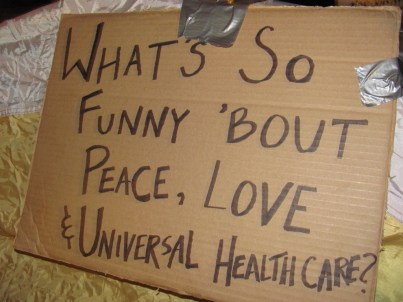
I don’t want to be looking up at this movement from a distance or a place of silence. I don’t want to be looking down on this movement from an ivory tower. This movement is interesting and meaningful because it is decidedly a very educated movement. And although a lot of its organizers and leaders (I know this is, like, a ‘leaderless’ movement, but let’s be real about who’s speaking and making decisions at these marches, okay) hold a lot of privilege, but hopefully that also means that they’re educated about privilege. And if they’re not able to recognize that, then honestly, what the fuck are we educating people for?
Am I being cynical or realistic? What is life? I’m exhausted from having an existential crisis every time I look at my Facebook news feed.
And I guess what I feel is hurt. Hurt as someone who has fought and talked and taught about justice, equality and visibility seeing a movement about these values taking off — and not seeing myself reflected in it.
I don’t think it’s wrong to ask what will be in it for me. I want to be included in the solution. I deserve it. During the Netroots Nation panel that I participated in, panelist Heidi Barton Stink made this point about inclusive spaces: If they’re not meant to include you, then they never truly will. And maybe that’s true. But what’s also true is that this large movement is made up of a lot of smaller movements. The grievances that these protesters claim are grievances that people in the United States have been facing for generations, and it is because of that that we should be involved. OWS makes the mistake of feeling like it in itself is the solution. But in reality, people have been working on finding a solution for ages. This is just a conglomeration of those groups, it’s an opportunity to gain followers and allies; it’s a wide audience for a number of messages. What exactly does ‘success’ mean for OWS? It could mean giving power to conversations and movements that activists, organizers and thinkers have been having for years. It could go beyond fighting against corporate greed to fighting for economic justice.
Having visited occupations in three different cities at three different points in the still-burgeoning movement, I’ve seen an explosion of progress, but I’ve also seen that there’s a lot farther to go. Each occupation is different, although the general sentiment is of course the same. The conversations that I’ve witnessed and participated in have reflected a lot of the activist culture in the respective cities of New York, Chicago and Washington, D.C. I’ve seen a people’s mic in New York that spouted mostly esoteric activist jargon about inclusion and consensus from the mouths of mostly white men. But I’ve also seen a people’s mic in Chicago that included a diversity (an actual diversity) of speakers discussing their causes and experiences, speaking about hope and solidarity, and about how our greatest power is to empower each other.
One of the most meaningful statements I’ve heard in the protests has been in Chicago, where a speaker at the people’s mic elaborated on the mantra “Enough is enough.” The phrase, he explained, should be more than just a statement about being fed up with bullshit. It should mean that enough is enough, literally, and for everyone. Enough money to live comfortably, enough to eat, enough to feel safe. It was a check on power and privilege, from corporate greed to personal ego.
At the end of the day, I will support Occupy Wall Street, though I probably won’t be camping out any time soon. The movement itself has ignited something fierce in thousands of people, and that fire has the potential to reside in thousands more — if the movement can diversify authentically.
A place where this is beginning to see success is in the inclusion of the labor unions. Corporations have historically abused and exploited immigrant labor, and now that fight is appropriately shifting its focus to communities of color and undocumented workers while still paying respect to the European immigrants who fought for labor rights legislation generations before. Why? Not because they’re trying to appear more diverse, but because these are the communities that these issues are disproportionately affecting. OWS could take some notes from that kind of shift.

via runswithcoyote.tumblr.com
I will continue to support it because I don’t think that support should equal silence and blind following, that’s not a movement I want to be a part of. I’m not going to be silent because I’m not going to watch this movement take off and leave me behind. I believe that there can be change because OWS has responded to criticism before, and the call for diversification grows louder and louder with each blog post, each conversation and each news story.
People are drawn to OWS because, well, it’s sexy. In an age of education, dissent is sexy, questioning is sexy; hitting the streets and camping out are all genuine, passionate and visceral reactions to a very real feeling of having been slighted. But it’s also a group of people who don’t quite know what to do with themselves. OWS is an easy thing to latch on to because it’s there. Because it’s real. Because people are talking about it, and even when that talk is criticism, that criticism is still validating its existence, because it’s proving that OWS is something worth talking about. Now it’s up to OWS to take that attention and that momentum and distribute it, because the only time that enough isn’t enough is when you’re talking about building the power of the people.
Hot Chicks of Occupy Wall Street
 Jess’s Team Pick:
Jess’s Team Pick:
There is now a video and tumblr (naturally) where you can preview the attractive group of hippy activists doing their thing down at Zuccotti Park. The aptly named Hot Chicks of Occupy Wall Street came from the brainspace of Washington D.C. documentary filmmaker Steven Greenstreet and is currently annoying a lot of feminist websites who say the video reduces women activists to sex objects, as he interviews articulate women but focuses on close ups of their hair, bodies and tattoos.
Sayeth Jezebel:
“Women who choose to protest are not there to be hot. They’re there to change minds. And failing to listen to their message because you’re distracted by their impeccable cheekbones isn’t a boon to the movement; it’s just annoying horndoggery.”
Greenstreet defends his project with the following mission statement:
“Our original ideas were admittedly sophomoric: Pics of hot chicks being all protesty, videos of hot chicks beating drums in slow-mo, etc. But when we arrived at Zuccotti Park in New York City, it evolved into something more. There was a vibrant energy in the air, a warmth of community and family, and the voices we heard were so hopeful and passionate. Pretty faces were making signs, giving speeches, organizing crowds, handing out food, singing, dancing, debating, hugging and marching. It made me want to pack my bags and pitch a tent on Wall Street. A lot of fantastic media has been created about the “Occupy” movement. I was watching one video in particular and commented to a friend, “Wow, seeing all those super smart hot chicks at the protest makes me want to be there.” He replied, “Hmmm… Yeah, let’s go with that.”
We instantly went to Tumblr and made hotchicksofoccupywallstreet.tumblr.com. Our original ideas were admittedly sophomoric: Pics of hot chicks being all protesty, videos of hot chicks beating drums in slow-mo, etc. But when we arrived at Zuccotti Park in New York City, it evolved into something more.
There was a vibrant energy in the air, a warmth of community and family, and the voices we heard were so hopeful and passionate. Pretty faces were making signs, giving speeches, organizing crowds, handing out food, singing, dancing, debating, hugging and marching.
It made me want to pack my bags and pitch a tent on Wall Street. And it’s in the light that we created this video. And we hope it makes you want to be there too.”
Here is a little something to take the edge off: An Occupy My Life marriage proposal at Liberty Plaza amid the protesters:
[yframe url=’https://www.youtube.com/watch?v=3KzMT2u0nlE’]
And for equal opportunity, The Shirtless Guys of Occupy Wall Street.
10 “Damn The Man” Documentary Films: A List For Occupying Wall Street
Have you occupied any pre-determined crowd-selected public spaces lately? Do you plan to? Are you a bit annoyed with the corporate takeover of American government, extreme wealth inequity and the mishandling of taxpayer-subsidized Wall Street bailouts? Sure you are! (No seriously what’s happening right now feels, oddly, like a dream come true.)
But why be annoyed when you could get ANGRY?! The best way to prepare for this kind of thing is to get as riled up as possible. I personally attribute at least 50% of my knowledge about Corruption and Corporate America to documentaries.
TTen Movies To Get You Really Riled Up And Ready to Occupy Something
+
Inside Job
[watch/buy]

This Academy-Award winning documentary, directed by Charles Ferguson and narrated by Matt Damon, is where you must begin with your journey towards Total Outrage.
The Director’s Statement:
“This film attempts to provide a comprehensive portrayal of an extremely important and timely subject: the worst financial crisis since the Depression, which continues to haunt us via Europe’s debt problems and global financial instability. It was a completely avoidable crisis; indeed for 40 years after the reforms following the Great Depression, the United States did not have a single financial crisis. However, the progressive deregulation of the financial sector since the 1980s gave rise to an increasingly criminal industry, whose “innovations” have produced a succession of financial crises. Each crisis has been worse than the last; and yet, due to the industry’s increasing wealth and power, each crisis has seen few people go to prison. In the case of this crisis, nobody has gone to prison, despite fraud that caused trillions of dollars in losses. I hope that the film, in less than two hours, will enable everyone to understand the fundamental nature and causes of this problem. It is also my hope that, whatever political opinions individual viewers may have, that after seeing this film we can all agree on the importance of restoring honesty and stability to our financial system, and of holding accountable those to destroyed it.”
+
+
+
Casino Jack and the United States of Money
[watch/buy]
Julie & Brandy in Your Box Office “Season One: The Sh*t You Didn’t See” contains excerpts from the abandoned episode wherein Julie & Brandy attended Casino Jack and the United States of Money and then wanted to punch people in the face. The film explains all the shady behind-the-scenes shit that fueled the economic crisis of 2008, led by one douchebag named Jack Abramoff, who spent like a minute in jail for all this crap.
+
+
+
Wal-Mart: The High Cost of Low Prices
[watch/buy]
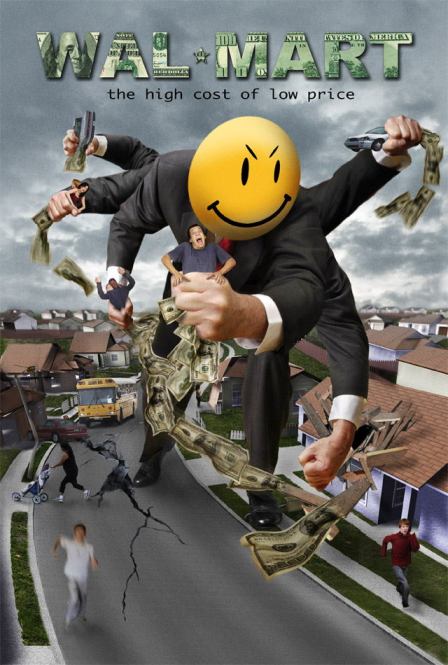 I wrote about this film a while ago and I said it then and I’ll say it again now — you need to see this. It’s the epitome of what Occupy Wall Street is protesting against. I tend to be too poor to vote with my wallet in general, but Wal-Mart is one store I will never shop in again, ever.
I wrote about this film a while ago and I said it then and I’ll say it again now — you need to see this. It’s the epitome of what Occupy Wall Street is protesting against. I tend to be too poor to vote with my wallet in general, but Wal-Mart is one store I will never shop in again, ever.
+
+
+
Sicko
[watch/buy]
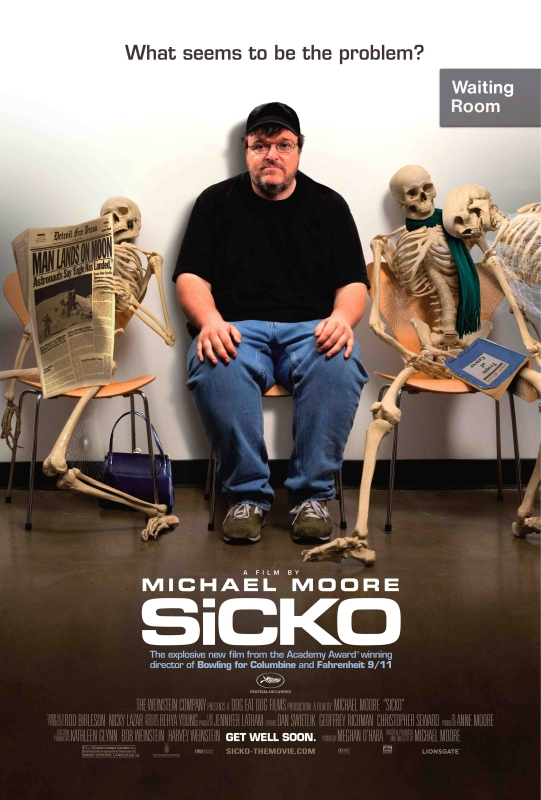
So everyone has mixed feelings about Michael Moore and many have really strong negative feelings about Michael Moore but this is a good movie. It’s about health care, obviously, but it’s also really about how the lack of free health care is what drives the sort of ruthless capitalism most Americans have no choice but to participate in — because getting a certain kind of job is literally a matter of life or death.
+
+
+
The One Percent
watch on youtube [it’s also on netflix instant watch]

In 2003, 20-year-old Jamie Johnson, heir to the Johnson & Johnson pharmaceutical empire, upset his family and a handful of other mega-rich people with Born Rich, a Sundance Selected Emmy-nominated documentary about what it’s like to be an heir to a fortune. He interviewed his friends including the Rockefellers, the Trumps, the whole nine yards, “candidly revealing the great privileges and the excess baggage that go along with their high net worth.”
In The One Percent, Jamie follows a similar line of questioning wherein he talks to some of the richest people in the country about their ethics, business practices, and everyday lives. Unsurprisingly, he upsets his family (and Warren Buffett) and reveals some complicated but deeply embedded systems of moral reconciliation for the economist who promoted the “trickle-down” idea to begin with.
+
++
![]()
We Are the 53%. Or not.
By Jill

Via alex pareene / salon.com
Oh man this “We Are the 53%” movement. It is actually very sad! Basically, conservative pundit Erick Erickson has started a campaign called “We Are the 53%,” to counter the “We Are the 99%” and Occupy Wall Street movements. According to Erickson’s (very simplistic) math, 53% of Americans pay more in federal income taxes than they receive back in deductions or credits, and so 53% of people are subsidizing everyone else. Which is… where to even start? Even people who don’t pay federal income tax still often pay property taxes and payroll taxes; everyone pays sale taxes. And part of the OWS argument is that corporations and many of the highest-earning Americans are paying very little in taxes, due to a series of loopholes and tax breaks.
That aside, Erickson’s site is very very sad. It is full of people who are extremely unlikely to be in the 53% — people who work several jobs to stay afloat, who can’t afford health insurance, whose parents worked themselves to the bone while dying of cancer. Those stories are held up as “the American Dream.” It’s kind of sick, actually. There’s a nice parody blog dedicated to it.
Hippie-punching is fun, I guess, and that seems to be Erickson’s motivation — he’s more interested in telling the Occupy Wall Street folks to “stop whining” than offering any solution other than “poor people are lazy.” And he does it with a web site that includes a lot of poor people all talking about how the system has kind of screwed them, but they’re living the dream and they “did it themselves.”
I realize a lot of people don’t want to feel like victims, and part of the difficulty the left faces is categorizing experiences and exploitations in a way that still allows people to identify with a group — Sady’s post about, among other things, self-identifying as “middle class” hints at this. A lot of people want to be on the A Team, or at least the team of “most folks.” That was, to me, the brilliance of the 99% campaign — it recognized that there’s a lot of diversity of experience within the 99 percent, but it gave people a group identity to latch onto. The problem is, Erickson’s campaign, asinine and divorced-from-reality as it might be, appeals to a lot of folks’ view of themselves as better than the next guy — harder-working, not looking for a hand-out, subsidizing all of Those People who are complaining whiners. In reality, of course, a lot of the people on Erickson’s 53% blog are the ones being “subsidized” (if we adopt Erickson’s terms); they’re people who have received welfare and other social services, they’re people who are definitely not paying federal income tax, and they’re people who need more than they’re getting.
But they’re latching onto Erickson because I suppose it feels better to self-identify as a winner. I’m not sure how, besides the populist 99% message, we can change that dynamic. This comment by Richard Lawson on the Gawker post is interesting to me:
This air of the nobility of the underclass is so sad and, cornily enough, eye-opening for me. It’s quite a feat that the oligarchs (for lack of a less sensational term) really have convinced these people that their poverty is noble and righteous and, in this life or the next, will somehow deliver them. You think about that 16% of African Americans who are living in poverty, or the insanely high number of single women and children living as such across all races and ethnicities, and you re
alize how fully they’ve taken to heart the persistent message they’ve been fed, in ways both subtle and profoundly grand, that theirs is a necessary suffering, one endured so the country can continue to function in the supposedly just and impartial way that it does. To be teenaged trendy about it, these people have been glamoured by vampires, have bared their necks and welcome the pain as a gift. It’s so deep and so bedrock in national mentality that the only salve seems, honestly, to be some sort of genuine revolution. I kind of feel like a French person in 1788. I wish these people knew they had allies behind them.
And people like Erick Erickson are nasty, willfully blind classist monsters. To prey on people this obviously downtrodden is ghoulishness of the highest order.
It’s worth pointing out, also, that Erickson’s site features mostly white people. It features people who are used to being on the A Team. I don’t think anyone on that site would actually say that they feel an air of nobility for being part of the underclass; I don’t think they believe they’re part of an American underclass at all.
Originally published on Feministe. Republished WITH PERMISSION MOTHERF*CKERS.
Occupy Wall Street and the 99% Took to the Streets and I Was There
Yesterday marked a significant moment for the Occupy Wall Street NYC encampment when for the first time major unions such as the Transit Workers Union and the City of New York teachers’ union openly gave support to the leaderless group, joining a student walk-out from schools across the city. Yesterday also marked the day I was at the protest myself.
Soon after the protest began Rachel gave us an overview of the happenings at the Occupy Wall Street protest, including the difficulty of pinpointing their aim in protesting and the comparison of this protest to that in Tahrir Square and the Arab Spring. As the storyline develops the Occupy Wall Street movement increasingly being characterized as the left’s counter to the Tea Party.The leaderless group continues to camp out in Manhattan’s financial district, and this week gained attention from more mainstream media sources such as CNN and support by celebs such as Susan Sarandon and Dr. Cornel West. Naomi Klein, author of No Logo! and The Shock Doctrine, is dropping by today. And then there was that time their date Radiohead stood them up. But Jeff Mangum of Neutral Milk Hotel did show up, and that’s not too shabby at all. Watch the video and sing along!
Making headlines over the weekend, a mass arrest occurred when over 700 protestors were arrested when they tried to cross the Brooklyn Bridge. Demonstrators claim the NYPD directed the march on to the bridge at which point they broke out kettle netting for the mass arrests. A lawsuit is already being filed on behalf of the protestors by the Partnership for Civil Justice Fund. You can read at least one person’s account of what happened here, or watch actual video footage.
Incredibly troubling is the story of transgender man and grassroots activist Justin Adkins who reported humiliation and abuse at the hands of the NYPD in his open statement after being arrested on the bridge.
My arresting officer found out I was born female when I yelled that information to the legal observer on the bridge. My arresting officer asked what I meant when I told the legal observer that I was “transgender” I told him that I was born female. He asked what “I had down there.” Since it is a rude and embarrassing question to ask someone about their genitals no matter what the situation, I simply told him again “I was born female.”
Maybe the most accurate comparison to Arab Spring is the fact that so much of what’s happening in these protests is recorded on video and freely available online; people are free to at least partially make their own sense of what’s going on, and to judge allegations of police brutality and mistreatment as well as witnessing the commitment of protesters firsthand. Last night, the live video feed was full of grainy scuffles filmed in the dark, with haunting chants and slogans from invisible protesters off-camera. Other video coverage is edited carefully and expertly produced, meant to act as a record of what’s happening in this moment.
Right Here All Over (Occupy Wall St.) from Alex Mallis on Vimeo.
While the goals of those camping out at Wall Street remain not-totally-specified (and not necessarily universal, since it’s a non-hierarchical leaderless movement), the common thread of economic discontent is drawing sympathy from across the country. Representing these feelings is the tumblr wearethe99percent, where people are sharing their stories of suffering under the current economic disparities between the wealthiest 1% and the rest of us:
We are the 99 percent. We are getting kicked out of our homes. We are forced to choose between groceries and rent. We are denied quality medical care. We are suffering from environmental pollution. We are working long hours for little pay and no rights, if we’re working at all. We are getting nothing while the other 1 percent is getting everything. We are the 99 percent.
Reading the tumblr made me ill. Learning how many in this country have advanced degrees, significant economic hardship due to family circumstance or health problems and can’t even land any sort of job to make ends meet or cover health care costs was horrifying. Hearing about this as a general concept is one thing, reading personal stories held by their authors is something else.
Criticism of the group’s undefined demands continue as the movement grows to other cities such as Boston, Washington,D.C., and Atlanta. Activist Jessica Yee criticizes the concept of using the word “occupy” in a protest movement on what is already occupied indigenous land. In a New York Time’s Op-Ed Nicholas Kristof offered some suggestions for specific demands, something the movement is currently lacking (besides, very reasonably, an end to reported police brutality), namely: 1) impose a financial transactions tax 2) close the loophole allowing the wealthy to pay low taxes and 3) protect big banks from themselves by legislating to limit risky behavior. I can’t say I saw any signs with those specific demands during the march or at the Occupy Wall Street encampment last night.
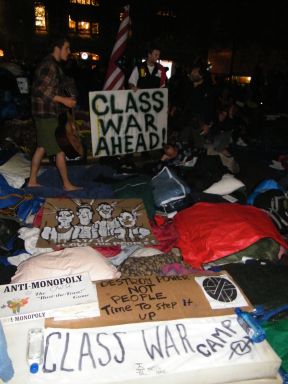
During the march some chanted, “Banks got bailed out, we got sold out!” in protest of the continued financial support for poor economic decisions of banks too big to fail. I marched near FIERCE, a membership-based organization building the leadership and power of lesbian, gay, bisexual, transgender and queer (LGBTQ) youth of color in NYC”, with their inspiring drummers and motivating chants.
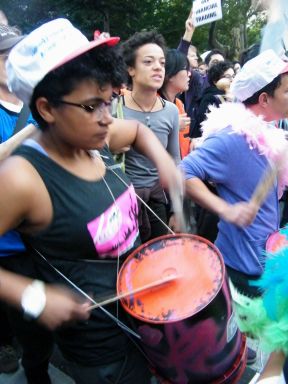
My girlfriend and I marched holding the banner “Feminism is for Lovers” and didn’t experience harassment from the cops during the march from City Hall to the encampment. During the march the NYPD were actually quite cordial, though about an hour after we left Zuccotti Park it seems the NYPD broke out batons and pepper spray as protestors made attempts to cross police barricades and reach Wall Street. Without a clear end in sight to the protests, tension between protestors and the NYPD continue to escalate.
During the march, demands ranged from an end to fracking to forgiveness of student loans. The hacker-activist group Anonymous is even threatening to shut down the NYSE in solidarity with the movement. Now that the movement is gaining some mainstream members beyond the ragtag band of activists who began the occupation three weeks ago (some estimates put the number of marchers last night at 15,000 people), will the Occupy Wall Street movement galvanize real change impacting the economic disparities in the country they are protesting? Will the incoming reports of police violence demand the attention of people who would otherwise have ignored it? Video coverage is making it harder and harder to ignore or disbelieve; The Awl says things will only get “more contentious,” noting that “this kind of tension always precedes a greater conflict.” It’s possible that with the influx of support by the unions some pressure may be placed on the Democratic party to recognize their demands (such as they are), not unlike how GOP candidates are finding it necessary to pay at least some lip service to the Tea Party. It’s becoming more and more clear that Occupy Wall Street really does mean to stay. What’s still not clear is whether anyone in power is willing to try to understand what they want and give it to them — or, barring that, what they’re willing to do to make them leave.
What Happened On Wall Street This Weekend
Some people are calling it the “American Tahrir Square,” which might surprise those who have managed to make it through the weekend and into the beginning of the work week without even hearing about the protests on Wall Street. If you didn’t know about them, it’s not surprising; they’ve been covered by very few mainstream media outlets, especially on TV. The facts are, basically, these: beginning on Saturday, protesters “took over” Wall Street, marching through the financial district with signs and blocking much of the traffic through the area. They haven’t left since. Numbers peaked around 5,000 on Saturday, and have settled at about 200 for those who appear to be in it for the long haul. Many are sleeping as well as working and organizing out of nearby Zucotti Park. They plan to stay for as long as is necessary.
To accomplish what? That’s more complicated. For the most part, the broad thrust of the protester’s goals seem pretty clear: to protest the ways in which politics and money have become unrepentant bedfellows, and to demand that at least some of the power that’s disproportionately held by corporations be put back in the hands of the people. This is the specific unrest of the underemployed and overeducated, people who locate ‘the problem’ as being with capitalism, not necessarily a government that isn’t allowing capitalism to work its magic. In that sense it’s a far cry from Tea Party ideology, although the sense of helpless rage finally finding form feels familiar. From the Wall Street Journal:
“There is plan to basically stay here until we can build enough people to bring a strong message,” said Joel Atkinson, 21, of Columbus, Oh. Referring to the spring’s mass uprising in Tahrir Square in Cairo that eventually unseated President Hosni Mubarak, he added: “We’re trying to model this after the uprising in Egypt.” Members of the group banged drums and carried signs that read ‘Yes to Equality, No to Austerity,’ and ‘No such thing as ‘too big to fail”.
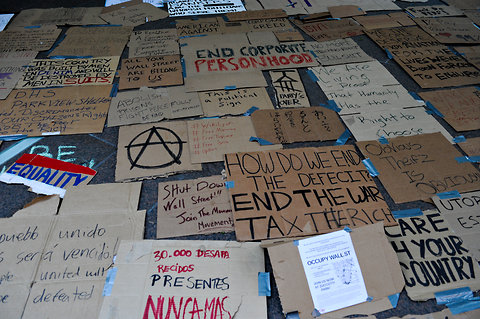
VIA THE NEW YORK TIMES
So far five people have been arrested; many, though not all, of the arrests seem to be about the Guy Fawkes masks (a reference to Anonymous) that are popular with protesters. Apparently it’s illegal for “two or more individuals to wear masks” in New York. One man was arrested for jumping over a police barrier and resisting arrest; one woman, Andrea Osborne, was arrested for reasons that bystanders can’t explain.
The protests are generally agreed to be non-hierarchical and ‘leaderless,’ but they originate from OccupyWallStreet, whose mission statement reads:
On the 17th of September, we want to see 20,000 people to flood into lower Manhattan, set up beds, kitchens, peaceful barricades and occupy Wall Street for a few months. Like our brothers and sisters in Egypt, Greece, Spain, and Iceland, we plan to use the revolutionary Arab Spring tactic of mass occupation to restore democracy in America. We also encourage the use of nonviolence to achieve our ends and maximize the safety of all participants.
Right now the site’s subheader is “The resistance continues at Liberty Plaza, with free pizza ;)”. As of today, they are accepting donations.
There are some differences between the current Wall Street protest and Arab Spring. For instance, the fact that “police, though out in large numbers, have remained low-key.” Or the fact that, rather than broadcasting their efforts worldwide with grainy cell phone video or trying to communicate through a state firewall, there’s a table set up in the square with laptops, next to the stations of peanut butter and scavenged food. Or the fact that they can walk away from this protest at any time without fearing repercussion for participating in it. Or the fact that none of these protesters are dead because of risking their lives by courting brutal assassination from a violent regime. Or maybe most importantly, while the protests in Tahrir Square had an extremely specific and urget goal — to successfully demand the resignation of Hosni Mubarak — the protest of Wall Street has a goal that is, at best, nebulous, and at worst nonexistent. The only mention of goals on OccupyWallStreet’s site are “restoring democracy” and “using nonviolence to achieve our ends.” It takes some digging to figure out more specifically what those ends are. The most concrete aim that seems to be floating around the internet is the desire to ‘take over’ Wall Street until President Obama establishes a commission on “the influence money has over our representatives in Washington.” It’s sourced to the original AdBusters call for a “Day of Rage” style protest. “In other words, an end to “corporate cronyism.” That seems like a different thing, one that the creation of a commission will not necessarily accomplish, but maybe that’s not the point.
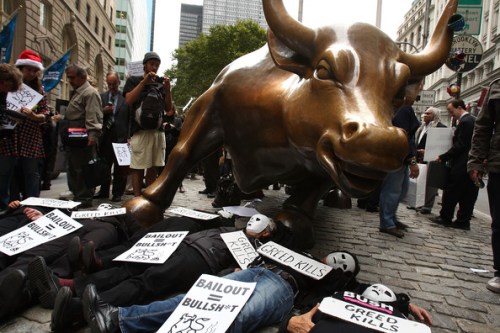
There’s actually something like a commission already being established — the Consumer Financial Protection Bureau, which Eileen Myles has helpfully written a little about. It’s not precisely in charge of keeping money and government separate, but it is a recognition of the fact that the way the government (“the system”) is dealing with money isn’t helping anyone, and someone needs to keep an eye on it because no one is now. Part of its purview is overseeing the behavior of banks, which seems like it would be a primary concern for people protesting Wall Street. Its creation was advised on by Elizabeth Warren, whose significant body of work on poverty, bankruptcy, and how the average citizen is failed by “the financial system” seems like it would make her fairly expert. You can read the latest on what they’ve been doing here.
It’s unlikely that any commission the Obama administration could create will be better able to respond to what the protester’s demands seem to be than what the Consumer Financial Protection Bureau already is. It seems equally unlikely that “corporate cronyism” will end in the next few weeks or months, regardless of what any 200 people do. If they stick to their guns, the Zucotti Park protesters may be there forever. But that might be okay, because unlike the Tahrir Square protesters, they’re being supplied with free pizza.
They spent Saturday and Sunday night in the small square, feasting on donated peanut butter, salads and cheese. On Sunday night, supporters of the protesters ordered the group pizza—so much pizza that the nearby pizza shop announced it would have to stay open until 1 a.m. just to fulfill orders. On Monday morning the group marched down Wall Street proper, beating drums and blowing whistles, and broadcasting a live stream of the whole thing on their website.
